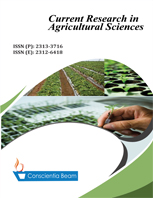Efficacy of Allicin (Allium Sativum Linn.) Against Bipolaris Sorokiniana in Barley Plants
Abstract
Spot blotch is caused by Bipolaris sorokiniana, and is the most deleterious disease for the producers. To control the disease, fungicides have been used that can impact the environment and human health. One method to eliminate these drawbacks is promoting induced protection. This study investigated the use of aqueous allicin extract as a biological control of B.sorokiniana or as an inducer of protection in barley plants (Embrapa BRS 195) against the pathogen under greenhouse conditions and also evaluated the possible mechanisms. Results demonstrated that induction was shown to have local and systemic action but don’t have biological control in concentration of 0.097 to 0.97 µg /mL of allicin. In order to prove the resistance effect, biochemical analyses were performed to quantify proteins, phenols and the enzymatic activity of beta-glucanase. Barley plants when treated with aqueous allicin extract, showed an increased in the concentration of proteins, as well in activity of the enzyme beta-glucanase, when compared with the extract from healthy plants. In infected plants, protein concentrations decreased and enzymatic activity was lower than in healthy plants. Biochemical analyses indicated that p-coumaric acid, benzoic acid, caffeic acid and salicylic acid increased in treated barley plants. In conclusion, allicin can act as a potential elicitor that can be used as an alternative for diseases control. It’s less dependent on chemical compounds, with a lower cost and causing less damage to the environment. The acting mechanism depends on the increase of salicylic acid and presence of other molecules (glucanase, proteins).

